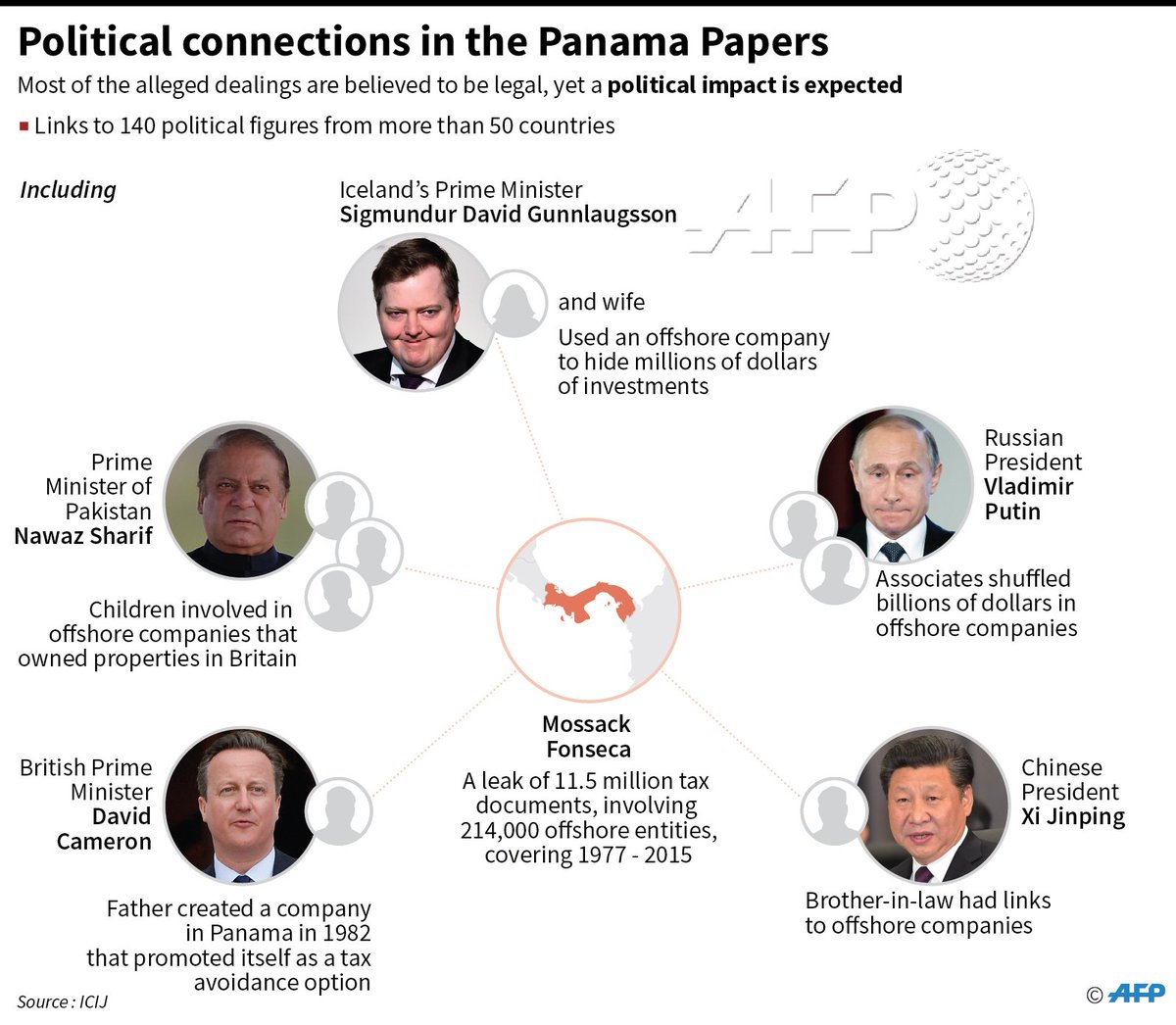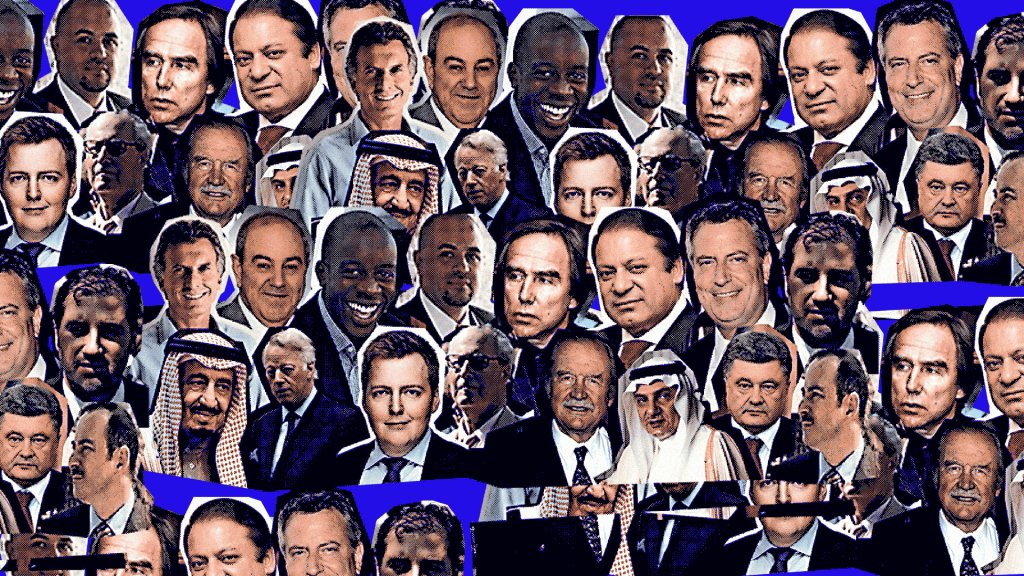A leak of 11 million confidential documents said to reveal how the world’s rich use tax havens to hide their wealth also allegedly shows how Putin’s associates are involved in a staggering billion-dollar money laundering business
Associates of President Vladimir Putin of Russia have channeled as much as $2 billion through offshore accounts, banks and shadow companies, according to a massive leak of documents from a Panamanian law firm.
More than 11 million documents, dubbed the Panama Papers, show how dozens of rich and powerful people around the world have used offshore and secret accounts to dodge taxes and sanctions and launder money.
The documents were leaked from the law firm Mossack Fonseca and connect to 140 politicians in more than 50 countries. Current and former leaders of Ukraine, Saudi Arabia, Argentina, Iceland, Georgia, Qatar and Iraq were among those named in the documents. Families and associates of Syrian president Bashar Assad, former Libyan dictator Moammar Gadhafi, and former Egyptian president Hosni Mubarak have also been implicated, the BBC reports.
An investigation by more than 100 media groups, described as one of the largest such probes in history, revealed the hidden offshore assets of around 140 political figures
Fusion has a breakdown of world leaders who are connected either themselves or through family or friends.
More than 370 journalists from 107 news organizations were involved in a year-long investigation, which began when the German newspaper Süddeutsche Zeitung was leaked 2.6 terabytes of data. Süddeutsche Zeitung then worked in collaboration with the International Consortium of Investigative Journalists, which published the findings Sunday along with other media partners.
"I think the leak will prove to be probably the biggest blow the offshore world has ever taken because of the extent of the documents," ICIJ director Gerard Ryle said to the BBC. The files go back through 40 years of the inner workings of the secretive law firm.
The ICIJ reports that the papers describe in detail the role of classical cellist Sergey Roldugin, a very close friend of Vladimir Putin, who is "a behind-the-scenes player in a clandestine network operated by Putin associates that has shuffled at least $2 billion through banks and offshore companies."
Roldugin is listed as the owner of several offshore companies, and is in "ostensible control" of $100 million worth of assets, The Guardian reports. Roldugin says he is not a businessman. But the ICIJ says evidence "suggests Roldugin is acting as a front man for a network of Putin loyalists – and perhaps for Putin himself."
From the ICIJ:
In almost every instance, the result is the same: money and power moves in the direction of the network, to companies and people allied to Putin. The network's covert deals allowed it to receive money in a variety of ways including hundreds of millions of dollars in sweetheart loans from a bank controlled by the Russian government.
Leading political figures in Iceland are named in the documents as well. The prime minister, finance minister and minister of the interior have "links" to secret offshore companies, Süddeutsche Zeitung reports.
FIFA, no stranger to scandal, also has a number of officials named in the leaked documents. Juan Pedro Damiani, who sits on FIFA's ethics committee, is now being investigated himself. According to Süddeutsche Zeitung, documents show Damiani "managed companies through which FIFA members may have received bribes."
Mossack Fonseca is one of the leading creators of shell companies, according to theCenter for Public Integrity. The ICIJ notes that the files include data on 214,488 "offshore entities" involving individuals in 200 countries and territories.
The law firm responded to the reports in a statement Sunday:
Mossack Fonseca is a leading international company with a presence in over 40 countries and with close to 40 years of history in the legal industry. We operate through our own and representative offices. All our offices maintain the highest due diligence standards that comply with all international laws and regulations.
They also said: "The vast majority of our clients are regulated entities, such as premier banks, attorneys, accountants, other law firms, trust companies, etc.―all of them well-known and reputable business companies and firms."

'Biggest leak in history'
The massive leak of documents recalls Wikileaks' exploits of 2010 -- which included the release of secret military files and diplomatic cables.
However, in terms of size, "the 'Panama Papers' is likely the biggest leak of inside information in history," according to ICIJ. "It is equally likely to be one of the most explosive in the nature of its revelations."
More than 500 banks, their subsidiaries and branches have worked with Mossack Fonseca since the 1970s to help clients manage offshore companies. UBS set up more than 1,100 and HSBC and its affiliates created more than 2,300.
The documents show "banks, law firms and other offshore players often fail to follow legal requirements to make sure clients are not involved in criminal enterprises, tax dodging or political corruption," the ICIJ said.
Mossack Fonseca is already subject to investigations in Germany and Brazil, where it is part of a huge money laundering probe that has threatened to topple the current government.
The ICIJ alleges its co-founder, Jurgen Mossack, may also have been involved in helping Britain's notorious Brink's-Mat robbers -- who stole 7,000 gold bars, diamonds and cash in 1983 -- keep their proceeds.
The law firm told the ICIJ the claim was "entirely false".
"These findings show how deeply ingrained harmful practices and criminality are in the offshore world," said Gabriel Zucman, an economist at the University of California, Berkeley, cited by the consortium.
The leaked documents were reviewed by a team of more than 370 reporters, though their source was not immediately clear.
The firm, Mossack Fonseca, one of the world's most secretive offshore law firms, said it had operated with impunity for decades in its efforts to help clients launder money and avoid tax.
A special report exposes the offshore holdings of 12 current and former world leaders and reveals that Putin's associates secretly shuffled as much as $2 billion via banks and shadow companies.
The leak documents link current and former leaders, including longtime Egyptian autocrat Hosny Mubarak and Syria's Bashar Assad, to illicit financial transactions.
The massive leak gives details about a suspected billion-dollar money laundering ring that was run by Bank Rossiya, which is subject to U.S. and EU sanctions following Russia's annexation of Crimea.
The firm, Mossack Fonseca, one of the world's most secretive offshore law firms, said it had operated with impunity for decades in its efforts to help clients launder money and avoid tax.
A special report exposes the offshore holdings of 12 current and former world leaders and reveals that Putin's associates secretly shuffled as much as $2 billion via banks and shadow companies.
The leak documents link current and former leaders, including longtime Egyptian autocrat Hosny Mubarak and Syria's Bashar Assad, to illicit financial transactions.
The massive leak gives details about a suspected billion-dollar money laundering ring that was run by Bank Rossiya, which is subject to U.S. and EU sanctions following Russia's annexation of Crimea.
Money has been channelled through offshore companies, two of which were officially owned by one of the Russian president's closest friends.
Sergey Roldugin, one of Putin's closest and dearest, and the godfather of Putin's eldest daughter Masha, is said to be a behind-the-scenes player in a clandestine network operated by Putin associates that shuffled at least $2 billion through banks and offshore companies.
In the report, it is also claimed that Roldugin was listed as the owner of the offshore companies that obtained payments from other companies worth tens of millions of dollars.
"In almost every instance, the result is the same: money and power moves in the direction of the network, to companies and people allied to Putin," the report adds, further stating that Putin's clandestine network's "covert deals" allowed it to receive money in a variety of ways including hundreds of millions of dollars in "sweetheart loans" from a bank controlled by the Russian government, in other words, the St. Petersburg-based Rossiya Bank which has been identified by the U.S. government as the "secret cashbox of Putin."
"Nowhere in the Mossack Fonseca files is the name of the Russian president, a former KGB spymaster, actually mentioned," the report says, adding that audio recordings and witness accounts show that even when Putin's closest confidants secretly discuss his financial dealings, they use pseudonyms for him or "simply gesture to the heavens rather than utter his name.
Mossack Fonseca data also shows how Iceland's Prime Minister Sigmundur Gunnlaugsson has been allegedly hiding millions of dollars of investments in his country's banks behind a secretive offshore company.
Leaked documents show that Gunnlaugsson and his wife bought offshore company Wintris in 2007.
The project, which included a team of more than 370 journalists from more than 70 countries, is believed to be the largest leak journalists have ever worked with. It contains 2.6 terabytes of data, 11.5 millions documents, and 214,000 shell companies.
Sergey Roldugin, one of Putin's closest and dearest, and the godfather of Putin's eldest daughter Masha, is said to be a behind-the-scenes player in a clandestine network operated by Putin associates that shuffled at least $2 billion through banks and offshore companies.
In the report, it is also claimed that Roldugin was listed as the owner of the offshore companies that obtained payments from other companies worth tens of millions of dollars.
"In almost every instance, the result is the same: money and power moves in the direction of the network, to companies and people allied to Putin," the report adds, further stating that Putin's clandestine network's "covert deals" allowed it to receive money in a variety of ways including hundreds of millions of dollars in "sweetheart loans" from a bank controlled by the Russian government, in other words, the St. Petersburg-based Rossiya Bank which has been identified by the U.S. government as the "secret cashbox of Putin."
"Nowhere in the Mossack Fonseca files is the name of the Russian president, a former KGB spymaster, actually mentioned," the report says, adding that audio recordings and witness accounts show that even when Putin's closest confidants secretly discuss his financial dealings, they use pseudonyms for him or "simply gesture to the heavens rather than utter his name.
Mossack Fonseca data also shows how Iceland's Prime Minister Sigmundur Gunnlaugsson has been allegedly hiding millions of dollars of investments in his country's banks behind a secretive offshore company.
Leaked documents show that Gunnlaugsson and his wife bought offshore company Wintris in 2007.
The project, which included a team of more than 370 journalists from more than 70 countries, is believed to be the largest leak journalists have ever worked with. It contains 2.6 terabytes of data, 11.5 millions documents, and 214,000 shell companies.

